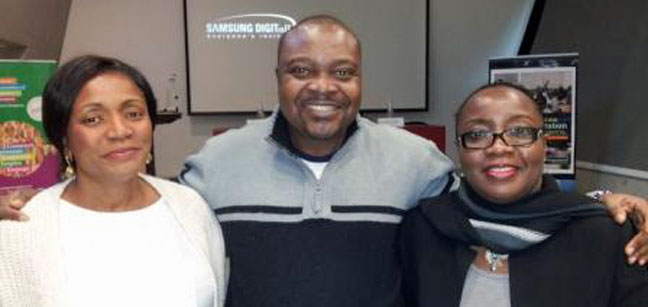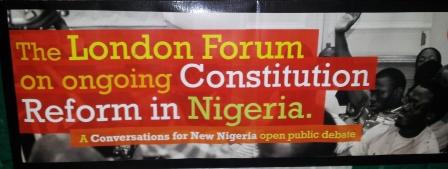Hostility greets Nigerian LGBT rights advocate
Colin Stewart is a 45-year journalism veteran living in Southern…
Nigerian LGBT rights activist Davis Mac-Iyalla, currently in the United Kingdom, is working hard to persuade other Nigerians of the wrongheadedness of the “Jail the Gays Bill,” which the Nigerian Senate has passed and asked Nigerian President Goodluck Jonathan to sign.
But depressingly widespread support for that bill was apparent in the silence and hostility that greeted Mac-Iyalla’s remarks earlier this month at a meeting for Nigerians in London. In these excerpts from Changing Attitude, Mac-Iyalla describes the scene at the Conversations for a New Nigeria’s public debate on constitutional reform:

When it was time for questions I raised my hand to ask the first question. I introduced myself and said that I am attending the forum wearing many hats. I am first and foremost a Nigerian, student, a human rights defender, gay and a public health advocate for black men, founder of Changing Attitude Nigeria, and a member LGBT Nigerians in the Diaspora Against Anti Same-Sex Marriage Laws . By the time I finished introducing myself the expression of people’s faces had changed.
I asked the honourable ladies why it’s so important for them to pass the Nigeria anti-same-sex marriage bill, knowing full well that we have inherited a law from our colonial masters which criminalizes homosexuality. I talked of how the bill was first introduced to parliament in 2006 and was renewed in 2009 and 2011 when the Senate passed it and forwarded it to the House of Representatives, where it has received two readings and might be passed to the president to be signed into law.
At this point the house become intense and I heard someone behind me saying please sit down. I could see the moderator at the table signalling that my time is up. I kept my calm knowing that I will never get another chance like this so continued.

I asked if Nigerians have actually studied the bill and understand the implications if the bill if passed. I pointed out that the bill is infringing the fundamental human rights of LGBT Nigerians, rights to love and live freely in their country. I talked of how this will make the non-governmental organizations and individuals which work in the area of HIV/AIDS illegal and will prevent their services from reaching targets groups like homosexuals or MSM (men who have sex with men).
I went further to talk of how this bill will criminalize religious ministers and groups like Changing Attitude Nigeria which gives pastoral and general support to LGBT people. Knowing that there were Muslims present I said even imams will be banned from giving support to homosexual Muslims if the bill is passed.
Again the tension in the room increased but I kept on talking about the relevant areas that makes this bill an abuse of the fundamental human rights of LGBT Nigerians. I was finally asked to sit down.
The next person to speak was a Muslim from Kebbi State. He pointed directly to me, said that homosexuality is wrong and that the bill needs to be passed. He received a loud round of applause from the audience.
The next person to speak said he is a Christian and that he is well-informed that the bill will not affect doctors or those who offer health services to homosexuals. He also got a big round of applause while everyone looked at me as if I should not have been there.
Many more people wanted to speak on the same-sex-marriage bill but the speaker requested that she should address the issue so we can move to more important things. She addressed me directly, saying that Nigeria must take a stand and pass this bill because homosexuality is a taboo, the Bible is against it, the Quran is against it, and it’s against our tradition and culture. She went on to say that what we already have is a penal code which says if you have carnal knowledge or anal sex with some of the same sex you will be punishable by 14 years in prison.
She said that is not enough because same sex-marriage is now taking place in countries like America and the UK so, if they don’t pass this bill soon, Nigerians will begin to demand that they want same-sex marriage. She looked at me directly in the eye and said she personally had moved the bill in the House and that the bill will be passed and the President will sign it into law and there are no two ways about it because it’s what they want.
She went on to say that America has been the reason for frustrating the bill because they have been lobbying and putting pressure on the government not to pass the bill. She said America has even given aid conditionally but the Nigerian lawmakers will make sure that, no matter the pressure, the bill will be passed, period.
Honourable Betty spoke after her, also addressing me directly and saying that they have done a good job around the Bill, looking at it clause by clause where it will affect innocent Nigerians and they will make sure it is amended before it comes out again. She then said to me, if I so passionately that if I believe that the bill is wrong, why didn’t I send a group or come in person to the public hearing which was open to all Nigerians to speak their mind. I was not given a chance to respond.
I wanted to remind her that LGBT Nigerians in Diaspora Against Anti Same Sex Laws were present at the hearing and that our position paper was the first to be read. I wanted to remind her how the representatives of the Nigeria LGBT Coalition were humiliated. I wanted to tell her that it’s they, the Nigeria lawmakers, that have not listened to the voices and contributions of LGBT Nigerians in the debate and public hearing. I didn’t have another chance to ask what has happened to all the statements and documents that have been submitted to Senate and House of Representatives by the Nigeria LGBT Coalition. I wanted to say loudly that Nigerian LGBT people at their own personal risk have been trying to come out publicly to air their voice against the bill and that it’s clear to me that those voices have been ignored. She concluded her address to me saying it too late now – we will pass the bill.
Soon after that a gentleman sitting behind me was allowed to speak. He went on to say he is not gay, has never met any homosexuals in Nigeria and that the only Nigerian homosexual he knew only came out to him here in the UK where they had both come to study. He said he didn’t have a problem with homosexuals as long as they didn’t approach him with their homosexuality. He directly questioned both lawmakers why among many issues facing Nigeria they are spending time debating and trying to pass anti same-sex marriage laws? He challenged the lawmakers, asking why are they not talking about paedophiles and the older men who are molesting young Nigerian girls. He mentioned a Nigerian senator who married a 13-year-old and asked why that is not a concern for the lawmakers rather than keep talking about the same-sex marriage bill which isn’t needed in Nigeria.
He was not applauded by the audience. Both of the law makers responded that they do understand the behaviour of some of their male colleagues and that they disprove of it. They said it was good that a man is the person actually pointing out this issue but they said young Nigerian girls also have to take responsibility. There was a lot of talk about this.
The meeting moved on to discuss questions about the constitutional reform. I had to attend another event so I left. The conversations for a New Nigeria have not recognised the rights of LGBT Nigerians in the diaspora or those at home. I plan to continue to bring this topic up in every debate about reforms in Nigeria until they realise that LGBT rights are also human rights.
Related articles
- Nigeria is one signature away from ‘Jail the Gays’ law (76crimes.com)
- ‘Homosexuality Is Very African As Much As It Is Nigerian.’ – Bisi Alimi speaks (rainbowethiopia1.net)
- NIGERIA: 7 Youths Arrested “on Suspicion of Homosexuality” (rodonline.typepad.com)


